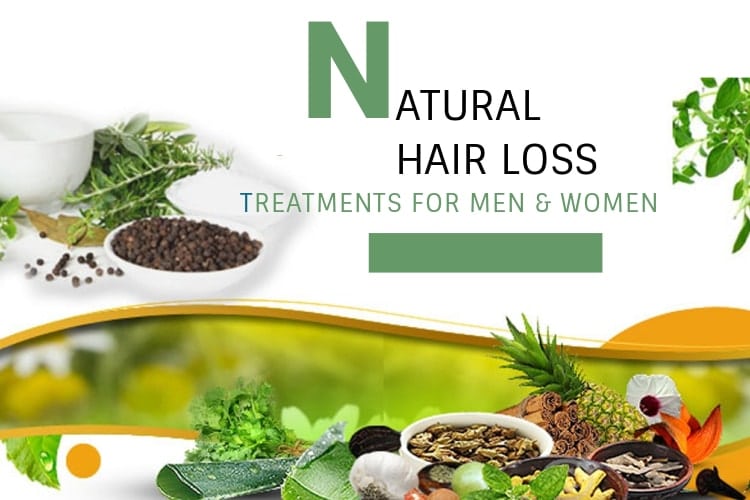
Buzz on Herbs and Food For Hair Loss
Baldness or loss of hair is referred to as alopecia. Alopecia totalis means loss of all the scalp hair.
Alopecia universalis means loss of all body hair. When the hair falls out in patches, it is termed alopecia areata. Factors that are involved in male hair loss include heredity, hormones, and aging.
Women sometimes have the same type of hair loss, but it is not as severe and usually occurs after menopause.
In addition, most women lose some hair two or three months after having a baby because hormonal changes during pregnancy prevent normal hair loss.
Table of Contents
Causes for Hair Loss
- poor circulation
- acute illness
- surgery
- radiation
- skin disease
- sudden weight loss
- iron deficiency
- diabetes
- thyroid disease
- drugs such as those used in chemotherapy
- stress, poor diet
- vitamin deficiency
- pregnancy
Eating for Hair Health
You are what t you eat. “The same foods that are good for your body and your health overall are good for your hair, including foods that are high in protein, low in carbohydrates and have reduced fat content,” says dermatologist Michael Reed, MD, an expert in female hair loss at New York University Medical Center in New York City. Reed says that what you put on your plate may not put hair on your head, but it can help the hair you do have to remain healthier longer.
Another important dietary need is essential fatty acids, found in foods like walnuts, canola oil, fish, and soy.
“This is just an observation, but I believe there are many people who may have a sub-clinical lack of omega 3 fatty acids — these are ‘good’ fats, which have anti-inflammatory properties and may actually play a role in healthy hair,” says Samantha Heller, MS, RD, a nutritionist at NYU Medical Center.
Heller also warns women that another potential deficiency — a lack of iron that often occurs during the reproductive years — can lead to anemia, a reduction of red blood cells that is often an undiagnosed cause of hair loss in women.
“The deficiency may be so slight you barely notice it, but it can play a role in female hair loss,” says Heller. Adding more iron-rich foods to your diet — like broccoli or brewer’s yeast — may actually help reverse some forms of hair loss, she says.
Also important to healthy hair growth are foods containing vitamin B12 — including eggs, meat, and poultry. According to dermatologist and hair loss expert Ted Daly, MD, it’s a nutrient hair just can’t live without, and women can easily develop a deficiency.
“In my office, it’s not uncommon to find a B12 deficiency in women who come in seeking treatment for hair loss,” says Daly, a clinical professor of dermatology at Nassau University Medical Center. Often, he says, supplements are necessary to restore levels, which in turn, can sometimes improve hair loss.
And while you’re reaching for that bottle of B12, don’t shortchange yourself on the other B vitamins, particularly biotin. According to experts, this nutrient is also essential for hair growth. It’s so important that biotin supplements are often prescribed right alongside medical hair loss treatments such as Propecia, Proscar, or minoxidil (Rogaine, Ronoxidil).
“Biotin is a major component in the natural hair manufacturing process — it is essential to not only grow new hair, but it also plays a major role in the overall health of skin and nails,” says Andrew Lessman, clinical researcher, and creator of Your Vitamins, an all-natural supplement line manufactured in Henderson, Nevada.
While Lessman says we can get biotin from our diet — it’s present in foods like liver and egg yolks — we would have to consume thousands of calories daily to get what our hair needs. That’s one reason why he and so many dermatologists suggest biotin supplements.
Indeed, Daly says he routinely recommends up to 3 mg of biotin daily for his hair loss patients, while Lessman developed a healthy hair, skin, and nails product containing 2 mg of biotin per daily dosage, which he believes is the minimum for healthy hair.
The recommended daily intake (RDI) of biotin is a scant 300 mcg — and even the healthiest diets usually contain no more than 30 to 50 mcg, says Lessman.
Both Daly and Reed also recommend zinc supplements — normally about 80 mg daily — because studies show this nutrient may affect the levels of androgens, the hormones involved in some forms of genetic hair loss.
Lessman and Heller, however, are more cautious, advising against the use of zinc supplementation in levels any higher than what might be in a multivitamin.
“It’s imperative that zinc and copper remain in the proper ratio. And unless you also supplement copper you don’t want to dramatically increase zinc intake,” says Lessman. What’s more, since both metals are pro-oxidants (meaning they contribute to unhealthy free radical formation) Lessman says supplementation in any significant amount would require careful health monitoring by a doctor.
Heller adds that taking too much zinc can also cause a copper deficiency, which in turn can actually cause hair loss — another reason she believes supplementation of these minerals is unnecessary.
What may be important for women to take, however, is the nutrient known as methylsulfonylmethane or MSM — a substance vital to the life of hair and skin.
“The same way that biotin is a component of the manufacturing process of hair, the sulfur found in MSM can be intrinsic to the structural development of hair — particularly because it is so well-absorbed,” says Lessman. He recommends 700 mg of MSM daily.
Herbs For Hair Loss
Among the herbs making medical headlines is saw palmetto, shown in clinical trials to have some impact on benign prostatic hyperplasia — or an enlarged prostate.
Because this condition has been linked to an increase in the same hormones related to hair loss — androgens, including testosterone — at least some experts believe that saw palmetto may work much like the hair loss drug finasteride (Propecia or Proscar), which was originally developed to treat prostate enlargement.
While there are no clinical trials attesting to saw palmetto’s usefulness as a treatment for hair loss, there is at least some reliable research showing that it can stop or at least reduce androgen activity within the hair follicle. Whether or not this can stop hair loss in women is completely unknown — a fact that causes Heller some concern.
“If the herb is strong enough to affect androgen pathways, then women should not be taking it without their doctor’s approval — particularly if they are using any form of female hormones, including HRT [menopausal hormone replacement therapy], birth control pills, or even phytoestrogens [such as soy],” says Heller.
What may be a bit safer for women to take is green tea, which some studies have shown may influence blood concentrations of hormones linked to at least one form of genetic hair loss known as androgenic alopecia. In one study published in the journal Nutrition and Cancer in 1998, Japanese researchers found that drinking green tea could increase levels of the sex hormone-binding globulin (SHBG) in women. Since this biochemical binds testosterone, the more SHBG present in a woman’s body, at least theoretically, the less testosterone will be in her bloodstream. And that, say some experts, may block the chain of hormonal activity that initiates some forms of hair loss
“I don’t think we have solid evidence that green tea can help, but it is certainly a good source of antioxidants and may have some anti-cancer properties, so it certainly would not hurt a woman to include it in her diet,” says Heller.
Other folklore treatments involving herbs and plants include licorice extract (thought to prevent hair loss, but can also increase blood pressure); horsetail (which is a source of silica, a component in healthy hair); apple cider vinegar and sage tea applied directly to the scalp (thought to stimulate hair growth); Psoralea seeds (a Chinese herb applied to the scalp) and ginger (either taken as a tea or applied to the scalp).
Hair Loss and Hair Care
The idea that hair care products — including shampoos, dyes, bleaches, perms, and even blow dryers — can damage your tresses should come as no surprise. However, what you may not realize is that hair damage from products or procedures is not the same as hair loss caused by genetic or even medical problems. Surprisingly, this means that hair care products generally don’t figure into the hair loss equation.
“Damage from hair care products or procedures generally causes breakage — which is not the same as hair loss that occurs at the level of the hair follicle — so it’s rare that anything you can put on your hair is going to increase the risk of hair loss. In this respect, he says, women suffering from hair loss don’t have to be afraid of grooming, or even color treating or perming their hair.
“It’s possible that a perming solution or a dye might inflame the scalp and cause problems related to hair loss, but that is very, very rare and not likely to happen,” says Daly.
At the same time, Reed says it’s also not a good idea to “punish” the hair you do have by over-processing — or by overusing a hot blow dryer.
“You should certainly observe the same common-sense rules you would if you didn’t suffer from hair loss, and take care of the hair you do have,” says Reed.






